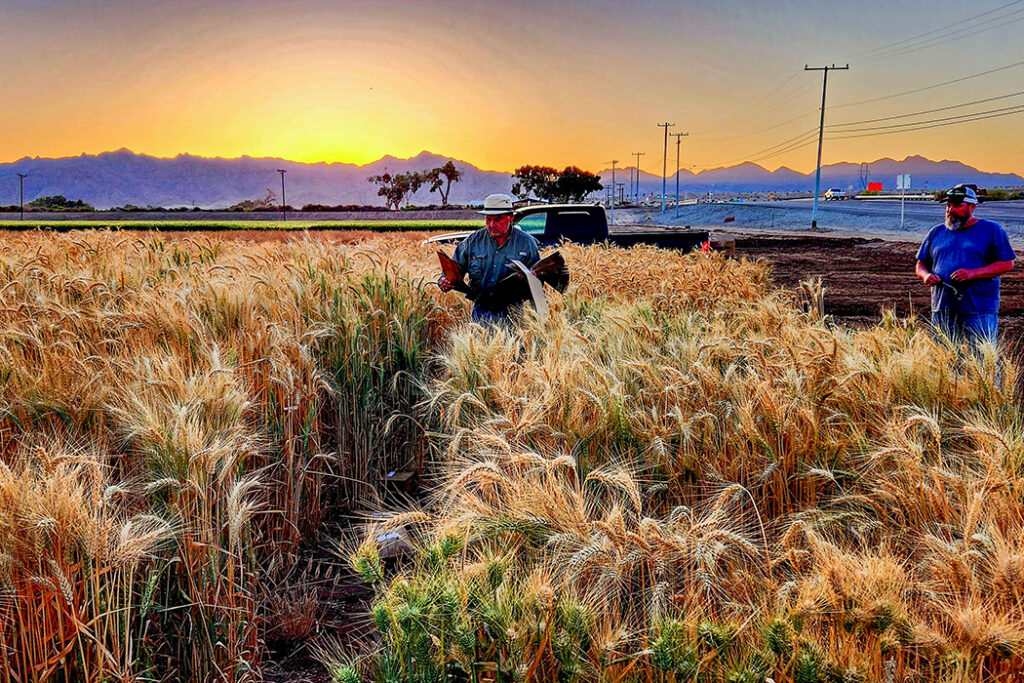WGC recognizes work of WSU spring wheat breeder, ROI to Washington growers
The Washington Grain Commission (WGC) is recognizing Washington State University (WSU) spring wheat breeder Mike Pumphrey and celebrating his contributions to the Washington wheat industry.
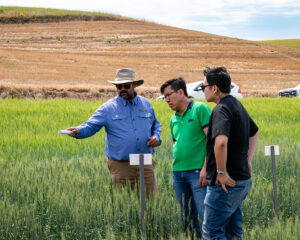
Pumphrey is a professor for WSU’s crop and soil sciences department and, until this year, co-held the O.A. Vogel Chair of Wheat Breeding and Genetics with WSU winter wheat breeder Arron Carter.
“Mike has elevated the profile of the spring wheat breading program to the highest possible level,” said WGC CEO Casey Chumrau. “The market dominance enjoyed by his varieties speaks to the impact of his work. The WGC is thrilled that endowment money was successfully leveraged to launch Mike’s program to a level where he can now fund his work through other means and release the endowment money to areas of greater need. Mike is truly one of the best scientific minds we have in the agricultural industry and Washington wheat growers are fortunate to benefit from his work.”
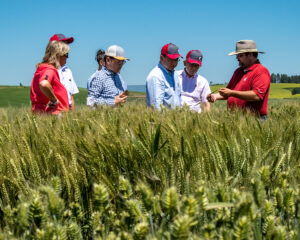
The O.A. Vogel Chair of Wheat Breeding and Genetics was the first of six research endowments created by the WGC at WSU to establish a perpetual funding mechanism for the advancement of the commission’s strategic research goals. The Vogel chair was established in 1990 through a partnership with the state of Washington, WSU and the WGC.
“Mike has accomplished exactly what the Orville A. Vogel Endowed Chair was established to do,” said Wendy Powers, Cashup Davis Family Endowed Dean of the College of Agricultural, Human, and Natural Resource Sciences. “His leadership, service, and release of impactful wheat varieties have been invaluable to the university’s work on behalf of the wheat industry.”
“Mike’s leadership in this position has been invaluable and the growers have truly benefited from this. His passion for the wheat industry sets an example for the students that he will continue to inspire,” said Mary Palmer Sullivan, WGC vice president.
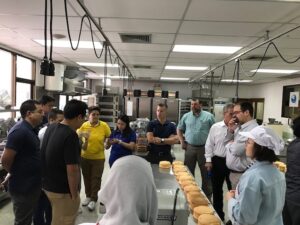
As a Vogel chair, Pumphrey participated in trade team and technical servicing activities through U.S. Wheat Associates (USW), the export market development organization for the U.S. wheat industry. For example, he joined a USW Wheat Quality Improvement Team in April 2017 that traveled to Bangkok, Thailand, and Taipei, Taiwan, to meet with Asian quality control specialists and reviewed sponge cake quality produced with different soft white wheat varieties, many from Washington.
“Mike, as a lifelong learner, understands that it is important to produce wheat varieties that meet the end-use quality characteristics valued by wheat buyers in the rapidly growing overseas markets in Southeast Asia,” said Steve Wirsching, vice president and director of the USW West Coast Office located in Portland, Oregon.
Pumphrey came to WSU in July 2009 from the U.S. Department of Agriculture’s Agricultural Research Service in Manhattan, Kansas, to take over the spring wheat breeding program. He informed the WGC in January that he is stepping down from his Vogel chair appointment to better focus on his WSU teaching and research activities.
“I am truly appreciative of the support provided by the O.A. Vogel Endowment and what it has meant to growing the spring wheat breeding program over the past eight years,” Pumphrey said. “With our current levels of federal funding, extramural grants, Washington Grain Commission support, and variety royalty revenue reinvestment, I feel like it is great time to re-direct these endowment funds to where they can do the most for Washington growers.”
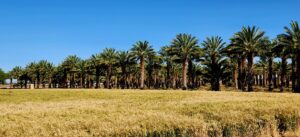
WSU varieties made up approximately 93% of the soft white spring wheat acres planted in Washington in 2023. With a dominant market-share established for spring wheat varieties from WSU over the past decade due to superior performance, it is clear the funds have been impactful.
“I believe that our use of O.A. Vogel Endowment funds to proactively address major production and financial constraints including stripe rust, Hessian fly, aluminum tolerance, falling-numbers, herbicide-tolerant wheat lines, and superior wheat quality have been impactful to date, and will continue to pay dividends over the coming decades,” Pumphrey said. “We have the necessary knowledge, tools, and germplasm that would not have existed without this support.”
Spring wheat breeding royalty revenue has recently started to reduce or offset annual funding requests from WSU to the WGC for spring wheat breeding related projects in the amount of $125,000 per year beginning in July 2024.
Pumphrey will continue to lead the spring wheat breeding and genetics program, along with his teaching and other research endeavors at WSU in Pullman. He is focused on the development of biotic and abiotic stress tolerant, high-yielding, and high-quality spring wheat varieties for diverse Washington (Pacific Northwest) production environments.
“We look forward to seeing what Mike’s program is able to accomplish in the coming years,” Chumrau said.
Carter, also a Vogel chair, continues to serve in that role and conduct highly valued research and education through his winter wheat breeding program. He is focused on high-yielding, disease resistant varieties with good end-use quality that will maintain profitability and reduce the risk to growers using a combination of traditional plant breeding methods, molecular marker technology, and biotechnology.
The WSU winter wheat breeding program is on a larger scale than spring wheat breeding, reflecting the scale of winter wheat acreage in Washington state. According to the U.S. Department of Agriculture, 78% of all wheat acres planted in Washington in 2023 were winter wheat. Carter’s winter wheat breeding program makes 800 crosses annually, evaluating about 60,000 head rows and 20,000 yield plots, along with operating four observation nurseries for disease ratings. This is comparable to other national public programs with a large impact on the industry.
“Advancing Washington wheat remains a WSU priority,” Powers added. “Funds from the Vogel chair have and will continue to support our globally recognized wheat breeding and genetics research.”
The Vogel endowment was established with an initial principal of $1.5 million. Through investment growth, the Vogel endowment now stands at over $2.5 million. Its 2022-23 research distributions were $116,000.
There are five additional research faculty positions that are funded in part by WGC endowments aimed at improving varietal development, end use and processing attributes, agronomics, production systems, economics, and new uses for wheat and barley.
The endowments are managed by WSU with distributions made annually to the research and extension program of the faculty researcher holding the endowment. These endowments are perpetual and require no further contributions from WGC to continue funding work on behalf of the wheat and barley industries and the state’s small grain producers into the future.
